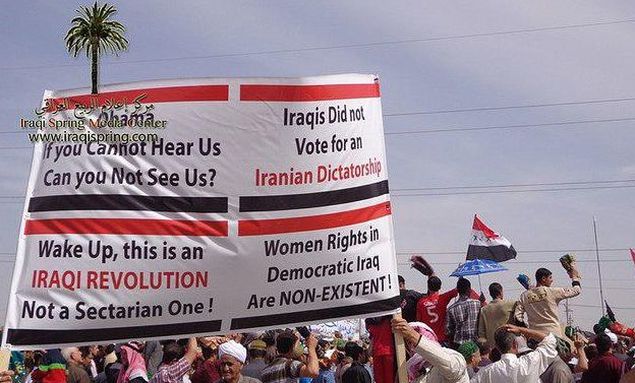Known locally as the Iraqi Spring, it erupted as crowds of protests flooded the streets of Iraq with years of bottled-up anger and frustration against the ruling establishment, headed at the time by prime minister Nouri al Maliki. The fires of discontent lit in Baghdad spread wildly, and reached a total of 11 different cities. Iraqis, in solidarity with their Arabs brothers and sisters, staged their own ‘Day of Rage’.
Protests turned violent, prompted by the government’s heavy handed response. The squares, sports stadia, mosques and urban centres occupied by civil society, were soon bloodied, as dozens were killed by Maliki’s security forces. The protest movement spoke in the name of only one community — neither Sunni, Shi’i or Kurdish — but Iraq, despite state efforts to vilify participants as terrorist sympathisers. Even Maliki’s televised plea urging people to stay home, to soothe the internal crisis, fell on deaf ears.
The escalating nationwide protests took a violent turn after Maliki’s men fired at unarmed protesters, killing dozens, but this only strengthened their resolve. Men in Fallujah and Mosul were gunned down in daylight, but momentum continued to build.
Over the next twelve months, tents were erected, squares were permanently occupied and cultural centres echoes with the peaceful demands of the masses.
After the bloody crackdown on Jan. 25 2011, a new phase of demonstration was planned in response. The spark that lit the second phase of Iraq’s turbulent spring, became the attack on Iraq’s ministry of finance by Maliki’s henchmen. People rallied in protests at the terror charges swiftly pinned on the staff of then former minister of finance, Rafeh al Issawi, and it became the catalyst for events to spiral beyond state control.
The general response to the Iraqi spring was silence, through the reassertion of violent practices and suppression. Events in Iraq, regardless of scale and severity, remained visibly absent from television debates, commentaries, and general public discourse about the Arab spring.
Joost Hiltermaan, deputy director for the International Crisis Group's Middle East program, quoted by the Washington Post, said "Obama wants to convey that 'Yes, Iraq has a number of problems that need to be addressed, but the country is on the right track.”
In response to the incident, Col. Barry A. Johnson, a spokesman for the United States military, said “Iraqi forces’ response appeared professional and restrained”.
What happened in Iraq, far from being an echo, as the few analysts who covered it describe, was among the earliest uprisings which called for jobs, services, political and judicial reform and the release of political prisoners.
- Immediate release of detained protesters and dissident prisoners
- Stop the death penalty
- Approve the amnesty law for innocent detainees
- The abolition of anti-terrorism laws, such as Clause 4, that is used to target them
- Repeal unfair rulings against dissidents
- To get balanced opportunities for work based on professionalism
- End the use of all military command based on geographic areas
- Provide essential services to all areas in Iraq neglected by the state
- Hold all members of official or security organisations who have committed crimes against dissidents accountable, especially those who have violated women in prisons
- UN Sponsored population count
- Stop agitating divisions between groups, end marginalization of Sunnis, & house searches based on secret sources with no legal warrant.
- Stop financial, administrative & legal corruption
- Fight sectarianism in every manner and by returning Religious buildings of all religions & properties to their rightful owners and the abolishment of law No. 19 of 2005
١-اطلاق سراح المعتقلات والمعتقلين ومحاسبة المقصرين
٢-ايقاف تنفيذ احكام الاعدام
٣- تعليق العمل بمادة ارهاب ٤ الى حين الغائها من قبل مجلس النواب
٤- تشريع قانون العفو العام
٥- ايقاف العمل بقانون المساءلة والعدالة
٦- تحقيق التوازن بجميع مؤسسات الدولة
٧- الغاء قيادات العمليات في جميع مناطق العراق
٨- اعادة التحقيق في القضايا التي تتعلق بالرموز الوطنية والدينية امام قضاء نزيه
٩- منع استخدام الشعارات الطائفية
١٠- اجراء تعداد سكاني شامل تحت اشراف الامم المتحدة
١١ - تجنب المداهمات العشوائية والغاء قانون المخبر السري
١٢- الاسراع في تشكيل المحكمة القضائية العليا بشكل مهني
١٣- اعادة جميع مساجد وكل دور العبادة لكافة لأديان والممتلكات المغتصبة وإلغاء قانون ١٩عام ٢٠٠٥
ملاحظة : لن يفض الاعتصام إلا بتحقيق كل هذه المطالب


 RSS Feed
RSS Feed